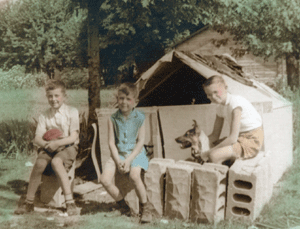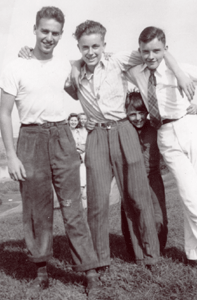I thought that headline would get your attention. We homeschoolers worry
a lot about whether our kids can make and keep friends. That’s why the
typical support group has such a crammed activities schedule, and why
our kids are members of Boy Scouts, Civil Air Patrol, soccer teams, and
so on—so our kids can get together with those of likeminded families.
We aren’t the only ones worrying about our kids’ friendships, either.
The first question every new homeschooler learns to dread is, “What
about socialization?” (See part 3 of Marlene Molewyk’s insightful answer
to this question, starting on page 36.)
Ironically, after all the guff and nonsense about whether homeschoolers
have enough friends, it emerges that, in the words of a June 16 New York
Times article, “Increasingly, some educators and other professionals who
work with children are asking a question that might surprise their
parents: Should a child really have a best friend?”
Are You Kidding?!
That was my first reaction on reading the article’s headline, “A Best
Friend? You Must Be Kidding!” But no, they are totally serious.
According to the NY Times article, “the classic best-friend bond—the two
special pals who share secrets and exploits, who gravitate to each other
on the playground and who head out the door together every day after
school—signals potential trouble for school officials intent on
discouraging anything that hints of exclusivity, in part because of
concerns about cliques and bullying.” As one private school director of
counseling said, “Parents sometimes say Johnny needs that one special
friend. We say he doesn’t need a best friend.”
 This isn’t just one adult’s opinions. People in charge of schools and
camps are now taking steps to make sure that kids who want to be best
friends are kept away from each other. “If two children seem to be too
focused on each other, [we] will make sure to put them on different
sports teams, seat them at different ends of the dining table or,
perhaps, have a counselor invite one of them to participate in an
activity with another child whom they haven’t yet gotten to know.” As
another private-school psychologist is quoted as saying, “The bottom
line is that if we find a best friend pairing to be destructive to
either child, or to others in the classroom, we will not hesitate to
separate children and to work with the children and their parents to
ensure healthier relationships in the future.”
This isn’t just one adult’s opinions. People in charge of schools and
camps are now taking steps to make sure that kids who want to be best
friends are kept away from each other. “If two children seem to be too
focused on each other, [we] will make sure to put them on different
sports teams, seat them at different ends of the dining table or,
perhaps, have a counselor invite one of them to participate in an
activity with another child whom they haven’t yet gotten to know.” As
another private-school psychologist is quoted as saying, “The bottom
line is that if we find a best friend pairing to be destructive to
either child, or to others in the classroom, we will not hesitate to
separate children and to work with the children and their parents to
ensure healthier relationships in the future.”
The comments on this article were ample and heartfelt. Some wrote that
they worry about kids (girls, especially) exhibiting extreme
possessiveness over their “BFFs” (Best Friends Forever, in teen
jargon). Others blamed parents for forcing only the “right” friends on
kids.
But most commenters spoke of their positive childhood experiences with
best friends, and of their horror that schools and other organizations
would deliberately set out to destroy these strong childhood bonds.
One person wrote, “As someone who was bullied horribly as a child, I can
tell you this: never once did I encounter being bullied by two best
friends. It was always the lone wolf. You know the kid: the one with no
best friend.”
Several wrote of their horrible experiences as natural introverts being
forced to constantly interact in groups, and the relief that one-on-one
friendships provided.
 Another wrote, “These educators are also deluded if they think that a
big group isn't capable of excluding others, in fact it can be more
painful to be excluded from a big group of peers than a few bullies who
stick together. Having one or two close friends is also vital to
pursuing interests—whether it's forming a band or writing the Justin
Bieber (or whatever it is that kids listen to these days) fanfiction
that will make you cringe and laugh 10 years later. I think these adults
are denying kids an essential experience.”
Another wrote, “These educators are also deluded if they think that a
big group isn't capable of excluding others, in fact it can be more
painful to be excluded from a big group of peers than a few bullies who
stick together. Having one or two close friends is also vital to
pursuing interests—whether it's forming a band or writing the Justin
Bieber (or whatever it is that kids listen to these days) fanfiction
that will make you cringe and laugh 10 years later. I think these adults
are denying kids an essential experience.”
After the article came out, MSNBC ran a poll asking the question,
“Should schools discourage kids from seeking out a best friend?” 96.4
percent of respondents (2,019 voters) said, “No!” and only 2.7 percent
(57 voters) said “Yes!” (On the down side, we don’t know if those who
said, “Yes!” are school counselors, administrators, and teachers.) Here
are some of the comments from those who took the poll:
- Next the “experts” will be choosing our children’s friends for
them, setting their play time, bed time, and when we are allowed to see
them.
- From an educational system increasingly given to absurd, knee-jerk
reactions, this may be the most profoundly stupid idea yet.
- Stupidest thing I’ve ever heard. Yet again, clueless adults
micromanaging children.
- No wonder our kids are growing up repressed and scared to be
themselves.
- First they decide who you can be friends with . . . next who can
have kids . . . then who can live where. . . don’t let this get started!
- Please, don’t think this is some liberal agenda. I’m a big ’ole
liberal and I think that the idiots that came up with this idea need to
be taken out back and beaten with a big stick for a long time.
- The only thing this will encourage is shallow, egotistic people who
only think of themselves because they have never learned that deep
meaningful relationships require thinking of the other person first,
compromise and the willingness to look beyond faults.
- It’s difficult to see how this might work when most adults have
best friends, and the students would see all of the adults practicing
the exact opposite of what they are supposed to be doing. Try telling
the teachers who they can sit with at lunch, and see how enthusiastic
they are about the new rules. . . . This type of social engineering goes
against human nature.
- As an only child my best friend is like the brother I never had.
Discouraging kids from having a best friend only reinforces the “you
can’t trust anyone” mentality developing in our society.
- It’s important to have someone you can be true to and vice versa.
I’m closer to my best friend than I am to my brothers.
If this anti-best-friend movement takes hold—which, if public- and
private-school parents have anything to say about it, it
won’t—homeschoolers will have yet one more advantage. Our kids will be
the only ones who are free to socialize naturally. In that case, our new
motto could be: “If you want your kids to have friends, hang out with
homeschoolers!”